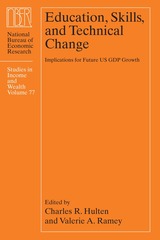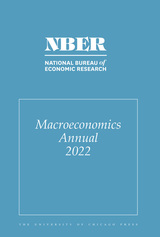2 books by Ramey, Valerie

Education, Skills, and Technical Change
Implications for Future US GDP Growth
Edited by Charles R. Hulten and Valerie A. Ramey
University of Chicago Press, 2018
Over the past few decades, US business and industry have been transformed by the advances and redundancies produced by the knowledge economy. The workplace has changed, and much of the work differs from that performed by previous generations. Can human capital accumulation in the United States keep pace with the evolving demands placed on it, and how can the workforce of tomorrow acquire the skills and competencies that are most in demand?
Education, Skills, and Technical Change explores various facets of these questions and provides an overview of educational attainment in the United States and the channels through which labor force skills and education affect GDP growth. Contributors to this volume focus on a range of educational and training institutions and bring new data to bear on how we understand the role of college and vocational education and the size and nature of the skills gap. This work links a range of research areas—such as growth accounting, skill development, higher education, and immigration—and also examines how well students are being prepared for the current and future world of work.
Education, Skills, and Technical Change explores various facets of these questions and provides an overview of educational attainment in the United States and the channels through which labor force skills and education affect GDP growth. Contributors to this volume focus on a range of educational and training institutions and bring new data to bear on how we understand the role of college and vocational education and the size and nature of the skills gap. This work links a range of research areas—such as growth accounting, skill development, higher education, and immigration—and also examines how well students are being prepared for the current and future world of work.
[more]

NBER Macroeconomics Annual, 2022
Volume 37
Edited by Martin Eichenbaum, Erik Hurst, and Valerie Ramey
University of Chicago Press Journals, 2023
Authoritative takes on the most current and pressing issues in macroeconomics today.
The NBER Macroeconomics Annual provides a forum for leading economists to participate in important debates in macroeconomics and to report on major developments in macroeconomic analysis and policy.
The NBER Macroeconomics Annual brings together leading scholars to discuss five research papers on central issues in contemporary macroeconomics. First, Andrea Eisfeldt, Antonio Falato, and Mindy Xiaolan document the rise of a new class of worker that receives part of its labor income as equity-based compensation, its role in the recent decline in the labor share of income, and implications for the returns to skilled labor and the implied capital-skill complementarity. Next, Michael Bauer and Eric Swanson focus on monetary policy shocks and argue the correlation between estimated monetary surprises and previously available information can be explained by uncertainty about the parameters of the monetary policy rule. Using new data and methods they find effects of monetary policy on macroeconomic variables that are much larger than previously estimated. Job Boerma and Loukas Karabarbounis provide a framework for quantitatively exploring the gap in wealth between White and Black Americans over the past 150 years and examine the effectiveness of reparations as a tool for closing this gap. Guido Menzio considers workers who do not have rational expectations, and whose “stubborn” beliefs change the response of wages to technology shocks, resulting in sticky wages. He finds that the larger the fraction of workers with stubborn beliefs, the more volatile unemployment is. Finally, Rishabh Aggarwal, Adrien Auclert, Matthew Rognlie, and Ludwig Straub investigate the growth—particularly in the United States—of private savings, current account deficits, and fiscal deficits after 2020. They argue that fiscal deficits lead to large and persistent increases in private savings and current account deficits.
The NBER Macroeconomics Annual provides a forum for leading economists to participate in important debates in macroeconomics and to report on major developments in macroeconomic analysis and policy.
The NBER Macroeconomics Annual brings together leading scholars to discuss five research papers on central issues in contemporary macroeconomics. First, Andrea Eisfeldt, Antonio Falato, and Mindy Xiaolan document the rise of a new class of worker that receives part of its labor income as equity-based compensation, its role in the recent decline in the labor share of income, and implications for the returns to skilled labor and the implied capital-skill complementarity. Next, Michael Bauer and Eric Swanson focus on monetary policy shocks and argue the correlation between estimated monetary surprises and previously available information can be explained by uncertainty about the parameters of the monetary policy rule. Using new data and methods they find effects of monetary policy on macroeconomic variables that are much larger than previously estimated. Job Boerma and Loukas Karabarbounis provide a framework for quantitatively exploring the gap in wealth between White and Black Americans over the past 150 years and examine the effectiveness of reparations as a tool for closing this gap. Guido Menzio considers workers who do not have rational expectations, and whose “stubborn” beliefs change the response of wages to technology shocks, resulting in sticky wages. He finds that the larger the fraction of workers with stubborn beliefs, the more volatile unemployment is. Finally, Rishabh Aggarwal, Adrien Auclert, Matthew Rognlie, and Ludwig Straub investigate the growth—particularly in the United States—of private savings, current account deficits, and fiscal deficits after 2020. They argue that fiscal deficits lead to large and persistent increases in private savings and current account deficits.
[more]
READERS
Browse our collection.
PUBLISHERS
See BiblioVault's publisher services.
STUDENT SERVICES
Files for college accessibility offices.
UChicago Accessibility Resources
home | accessibility | search | about | contact us
BiblioVault ® 2001 - 2024
The University of Chicago Press









